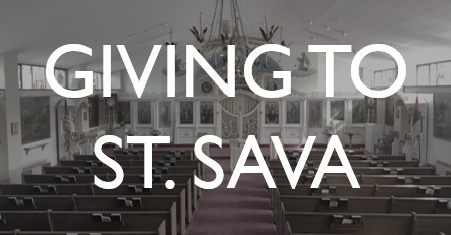Serbian Slava or Krsna Slava
|
|
Kolac - Prepared for St. George Slava |
The celebration of the family Patron Saint’s Day (Slava or Krsna Slava) is a uniquely Serbian custom. All members of the same family or community observe together a day set aside to honor their saint or protector. The saint remains unchanged from father to son as a traditional inheritance. This celebration originated in pre-Christian times, when each family had its particular family God. Later, when Serbs became Christians, they transferred this observance to Christian saints, selecting some saint with special meaning to the family or the saint whose celebration day was nearest the day when the family accepted Christianity.
After their coming to the Balkan Peninsula, the life of the Serbian people changed. From a nomadic people they became farmers, tied to one place and their land. Family life became very important and, as they settled, they accepted the higher, more civilized ideas of religion developed in Greek Christianity. The bloodless sacrifices of the Church were then adopted by Serbian families. Saint Sava, in his reformatory work, definitely abolished blood sacrifices and established the Christian symbols of Krsna Slava, which are the candle (vostanica), wheat (koljivo), and bread (kolac). Every part of the Krsna Slava ritual describes the life, passion and resurrection of Jesus Christ. Wheat (panagija) was established as the most holy and symbolic secret of nativity and life. Everything is born from seed. So, in the nativity, the mystical commandment of God is fulfilled. The single wheat grain obtained its name, “panagija”, (All Holy Mother, give of birth) from the Greek “panagion.” Also, wheat was the main source of existence. Even today, the Krsna Slava ritual still involves a series of beautiful symbols in the blessing of the wheat and the breaking of the bread.
In Europe and America, there are many different ways of celebrating the Krsna Slava, depending on the particular region, but the basic idea is the same everywhere: worship of the Patron Saint with a bloodless sacrifice. The most common way of celebrating in this manner: the host goes to the church to attend the Holy Liturgy. He takes to church a Patron Saint’s Cake (Slavski Kolac), a bowl of cooked wheat sweetened with honey or sugar (koljivo) and the “Book in Memoriam” (citulja) from which, during the Holy Liturgy, the priest reads the names of the host’s deceased relatives. The priest also cut and blesses the Patron Saint’s Cake, according to a prescribed rite. (Koljivo is prepared only in commemoration of patron saints who died. The Holy Archangels and Saint Elijah did not pass through death. Therefore, Koljivo is not prepared for them.)
Meanwhile, at home, the table is prepared for the celebration. Returning form church, the host places the cake and wheat on the table and lights a candle, which burns all day. Later, relatives and friends gather at the home of the celebrant to share in the festivities and partake of the celebration dinner. The host (always the male head of the household) prays to God and his Patron Saint and then serves his guests. (The host is never seated during the dinner.) Every guest receives a small portion of the Patron Saint’s Cake as well as of the wheat. In many regions, it is the custom to invite the priest to perform the “Cutting of the Patron Saint’s Cake,” at the home of the celebrant.
- Courtesy of the St. Sava Serbian Orthodox Church - 100th Anniversary Cookbook - Publication 2001
Cutting of the Kolac Cake
The following is a video of the "Cutting of the Kolac Cake." This was from the St. Sava Holy Trinity Kolo Slava - May 27, 2018.


